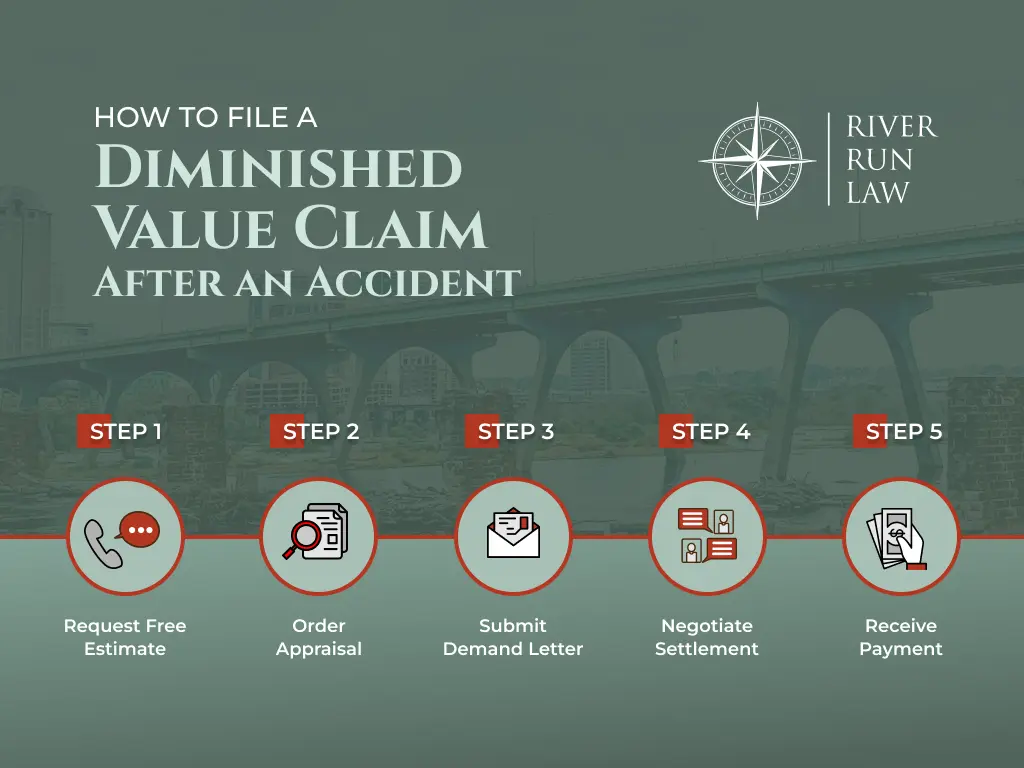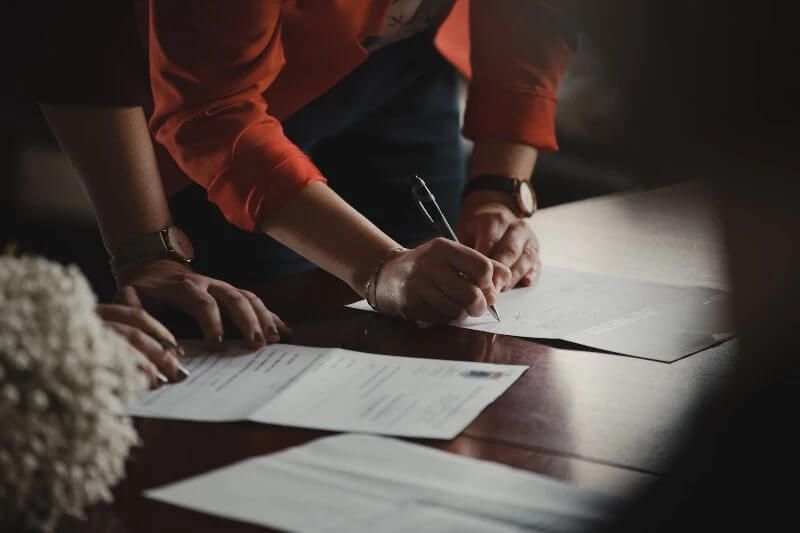Brooke graduated from the University of Richmond School of Law after receiving her undergraduate degree from the University of North Carolina at Chapel Hill. Brooke worked for five years in private practice with a law firm specializing in insurance defense litigation before becoming the trial litigator for Allstate Insurance Company in the metro Richmond area.
Virginia motorists are entitled to compensation after an automobile wreck caused by another. This includes all property damage to their cars.
Under most auto insurance policies, insurance agencies broadly promise to pay for direct damages resulting from an auto accident.
In cases like this, a motorist in Virginia may be able to file a diminished value claim to compensate them for the full resale value of their car.
River Run Law has extensive knowledge of accident claims in Virginia. We can review your case and ensure that nothing is overlooked.
To get started, please contact the Richmond personal injury lawyers at River Run Law.
What Is Diminished Value Compensation in Virginia?
Virginia law defines “diminished value compensation” as the amount of compensation that an insurance company pays to a third party vehicle owner, in addition to the cost of repairs, for the reduced value of a vehicle due to damage.
In other words, a diminished value claim allows you to recover the resale value of your car.
The resale value must factor in the stigma naturally associated with a car after it’s been in an accident.
Even if you can repair the car, CarFax and other companies will record its history.
Imagine being on a car lot, choosing between two cars identical in every respect except that one has been in a wreck. Which one would you pick?
What is a Diminished Value Claim?
A diminished value claim is a demand for the difference between the pre-accident value of your car and its post-accident value.
You are seeking the compensation you stand to lose when selling the car because of the damages done in the accident.
In Virginia, a diminished value claim is defined by Virginia Code §46.2-1600 as the compensation that an insurance company pays to a third-party vehicle owner. This compensation, in addition to covering the cost of repairs, is intended to address the reduced value of the vehicle resulting from damage.
Should I File a Diminished Value Claim?
A diminished value claim is not for everyone. For starters, the accident that caused the damage must have occurred within the Virginia statute of limitations.
A statute of limitations is a law that says how much time you have to sue another person for personal injury or property damage.
With respect to automobile accidents, Virginia law generally provides that motorists have two years from the date of the accident to pursue a personal injury claim or five years from the date of the accident to pursue a claim for property damage.
Diminished value claims are appropriate when the vehicle is valuable. The damage is usually significant.
For example, a rare 1980 Corvette that suffers frame damage in an accident would carry a significant stigma to potential buyers.
In this scenario, the difference between the value of the car before the wreck and the car’s value after repairs would be substantial.
In comparison, the resale value of a 1980 Honda Accord with cosmetic damage would depreciate very little after a wreck. In this situation, it might not be worth the time and money to file a diminished value claim.
How Does a Diminished Value Claim Work?
Generally, in Virginia, you will file a third-party insurance claim for the diminished value of your car.
In other words, if the other driver is at fault for the accident, you will file your diminished value claim with their insurance company.
This is known as a third-party claim. Typically, you cannot file a diminished value claim with your own insurance company unless the other driver is uninsured.
Documenting the extent of your vehicle’s damage through photos is imperative.
You will also need the car inspected and appraised, and, in certain circumstances, you will need an expert to testify about the damage, cost, etc.
How Do I File a Diminished Value Claim?

Filing a diminished value claim involves two basic steps.
- Step 1. Proof of Diminished Value. Obtain proof of your vehicle’s diminished value by hiring a licensed, qualified, and independent diminished value expert to appraise your vehicle. Although not required, it is a good idea to have a local expert if you need them to testify later. The more detailed, reliable, and competent the report, the more likely it will be accepted and paid for by the insurance company.
- Step 2. File a Demand Letter. Next, you must file a demand letter, alongside supporting documentation (i.e., the diminished value appraisal), to the appropriate insurance company. It would be best to do this immediately after your vehicle is repaired.
Negotiations will begin once you file your claim with the appropriate insurance company.
How Do I Negotiate a Diminished Value Claim?
Negotiating a diminished value claim can be challenging.
Three tips to successfully negotiating your diminished value claim are to act quickly, obtain more than one appraisal, and hire an attorney.
If you are seeking the reduced value of your vehicle after an accident, it is essential to act quickly.
Although you have five years to file the claim, you want to file it as soon as possible while the damage, estimates, and appraisals are fresh.
It may also be necessary to obtain multiple appraisals to present evidence of a fair and accurate valuation to the insurance company.
Above all else, the best way to negotiate a diminished value claim is to speak with your attorney during your auto accident consultation.
If you are pursuing compensation for injuries, you may also have a claim for the diminished value of your vehicle.
Contact a Virginia Diminished Value Claim Lawyer
You may have a claim for diminished value if you are not the driver at fault. Take detailed photographs of your vehicle before and after repairs.
In addition, you should hire a reputable appraiser to determine the resale value of the car after repairs.
The River Run Law team get clients full compensation for the diminished value of their vehicle. Our firm commits to our clients.
Our Richmond personal injury lawyers provide the highest possible level of professionalism, responsiveness, quality, and value.
Contact us online or call now to schedule a free consultation and case evaluation.

Where You Can Find Our Richmond, VA Office Location



